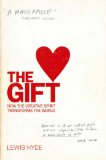|
This book is hard to classify: the author himself devotes the book's foreward
to explaining why it doesn't easily fit into any of the usual categories. After
admitting the difficulty for his publisher of describing the book in a short
blurb, the last sentence in the foreward is:
And if the salesman want to pitch it as `Bad-boy critic deploys magic charm
against vampire economy', that's all right with me.
The book dates from 1979, but has recently been republished in the UK. Its
subject matter is not Free Software. It includes discussion of (among other
things): Celtic folklore, the anthropology of the native North American
peoples, the history and theology of usury before and after the Reformation,
the ethics of organ donation, the poetry of Walt Whitman and Ezra Pound, the
early history of patents and a great deal more.
Only in the ``afterword'' provided for this British edition does the author
discuss in passing matters guaranteed to be of direct interest to readers of
this newsletter: the current period for which copyright is protected in the US,
publishing of scientific papers under permissive licences, and the briefest
possible passing mention of open source.
All that being said, ``The Gift'' is deeply relevant to our concerns. Eric
Raymond and others have characterised the Open Source and Free Software
communities as ``gift economies'' as opposed to ``market economies''. Hyde
describes what that concept means from an anthropological point of view, and
also makes a case for his view that serious artistic expression is by its
nature a gift rather than a commodity.
In a gift economy, the person who gives most is the one with the greatest
status, not the one who has the most. Similarly, in a gift economy, the worst
sin is to consume or hide away the gift that has been received: gifts must
continually be passed on.
The parallels with the Free and Open Source software world are very clear, and
the kind of ``sacred obligation'' entailed by gifts in traditional societies is
mirrored in the very strong feelings in our communities about how the gifts
that we have received should be used and transmitted.
Although the replacement of tribal and local economies by a global one has
converted many of our relationships into purely commercial ones, the examples
that Hyde gives of organ donation, artistic expression and scientific
publishing show how there is a very strong and persistent feeling that some
things can only be transmitted and received in the form of gifts. Such things
change the nature of the relationship between the parties involved. New forms
of communication (the Internet) and new ways of insisting on the obligations
that a gift traditionally carries with it (the GPL) have re-enabled older and
wiser ways of organising communities. The book helps to put that process into
a wider historical and cultural context.
Buy it from Amazon (UK)
|

